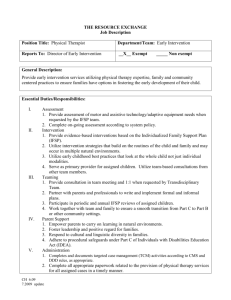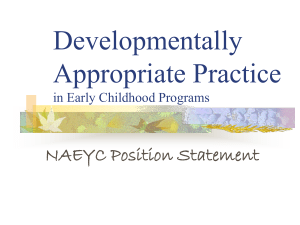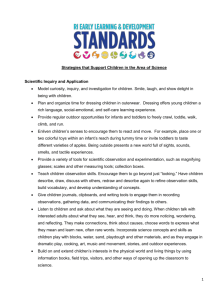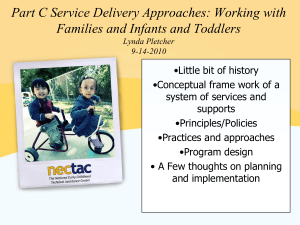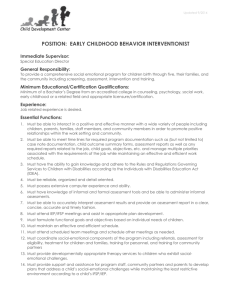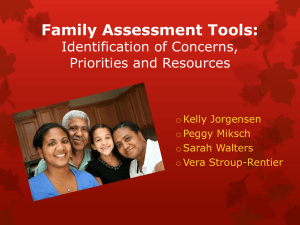_UNDERGRADUATE CURRICULUM - University of Wisconsin
advertisement
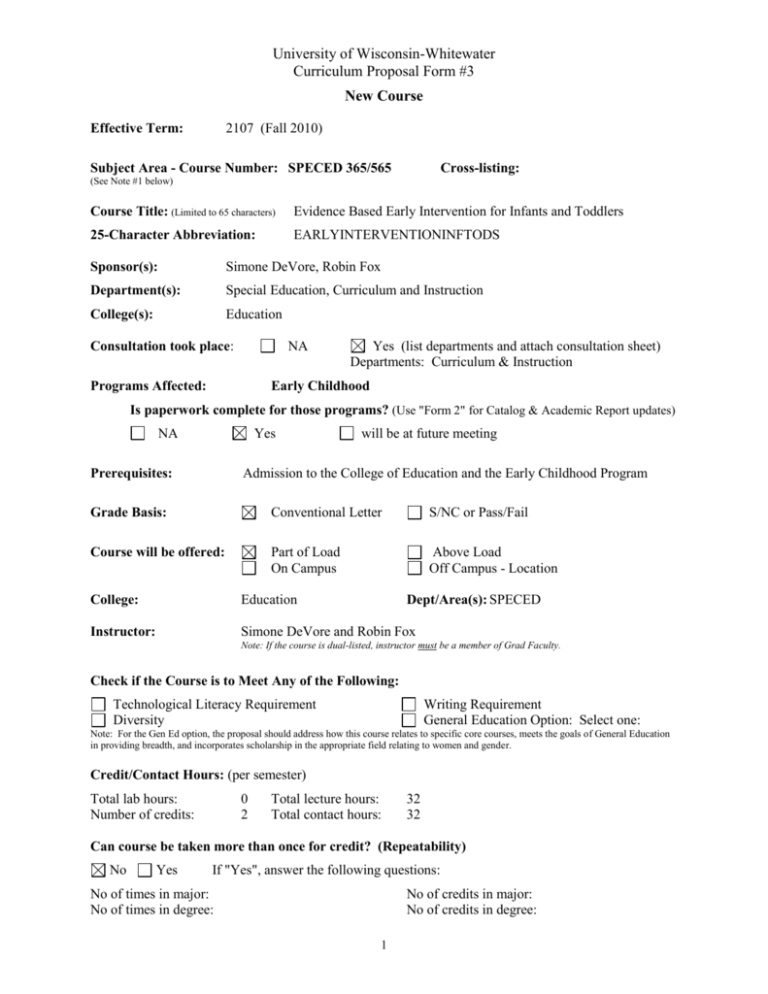
University of Wisconsin-Whitewater Curriculum Proposal Form #3 New Course Effective Term: 2107 (Fall 2010) Subject Area - Course Number: SPECED 365/565 Cross-listing: (See Note #1 below) Course Title: (Limited to 65 characters) Evidence Based Early Intervention for Infants and Toddlers 25-Character Abbreviation: EARLYINTERVENTIONINFTODS Sponsor(s): Simone DeVore, Robin Fox Department(s): Special Education, Curriculum and Instruction College(s): Education Consultation took place: NA Programs Affected: Yes (list departments and attach consultation sheet) Departments: Curriculum & Instruction Early Childhood Is paperwork complete for those programs? (Use "Form 2" for Catalog & Academic Report updates) NA Yes Prerequisites: will be at future meeting Admission to the College of Education and the Early Childhood Program Grade Basis: Conventional Letter S/NC or Pass/Fail Course will be offered: Part of Load On Campus Above Load Off Campus - Location College: Education Dept/Area(s): SPECED Instructor: Simone DeVore and Robin Fox Note: If the course is dual-listed, instructor must be a member of Grad Faculty. Check if the Course is to Meet Any of the Following: Technological Literacy Requirement Diversity Writing Requirement General Education Option: Select one: Note: For the Gen Ed option, the proposal should address how this course relates to specific core courses, meets the goals of General Education in providing breadth, and incorporates scholarship in the appropriate field relating to women and gender. Credit/Contact Hours: (per semester) Total lab hours: Number of credits: 0 2 Total lecture hours: Total contact hours: 32 32 Can course be taken more than once for credit? (Repeatability) No Yes If "Yes", answer the following questions: No of times in major: No of times in degree: No of credits in major: No of credits in degree: 1 Proposal Information: (Procedures for form #3) Course justification: There is a current course required for Early Childhood majors to take related to working with infants, toddlers and their families. It has become apparent to the faculty in the Early Childhood program that this course is not meeting the needs of the students. The content of the course is too broad and there is a critical piece missing which is infant and toddler mental health issues. The development of this course and the revision of the existing course will allow the instructor to focus on the specific content necessary for students to be successful working with infants and toddlers. The graduate course is needed for post baccalaureate students who want to add Early Childhood Special Education (809) license to existing teaching licenses. The graduate students are able to use the graduate course towards a Master’s of Science in Special Education – Professional Development degree as part of the specialization core area. Relationship to program assessment objectives: As an early childhood dual licensure program our students need a course in which the focus is working with infants and toddlers (along with their families) who need early intervention. Additionally, many graduate students come to us with coursework in “regular” education related to infants and toddlers but need coursework in early intervention. Budgetary impact: As we are revising several courses in the Early Childhood program we have been acutely aware of the necessity to keep the total number of credits the same while offering a program that is more responsive to the needs of the students and the early childhood workforce. There is no budgetary impact for this additional course. Course description: (50 word limit) This course examines relevant theories and pertinent research pertaining to care of infants and toddlers with special needs within the family setting and in group care programs. Content includes an examination of legislative action that calls for intervention services for the birth to three population in natural settings, screening and assessment procedures, eligibility criteria for service delivery, working closely with and supporting families, and team collaboration styles. Mental health issues related to infants and toddlers are examined in relation to those who provide care to this population. If dual listed, list graduate level requirements for the following: 1. Content (e.g., What are additional presentation/project requirements?) Graduate students will complete an additional IFSP and will present the findings to the class. 2. Intensity (e.g., How are the processes and standards of evaluation different for graduates and undergraduates? ) The grading criteria for the graduate students are more rigorous (please see the syllabus). The rubrics for the assignments will be the same, however, graduate students will need to receive more points in order to receive the same letter grade at the undergraduate students. 3. Self-Directed (e.g., How are research expectations differ for graduates and undergraduates?) It is expected that the graduate students will complete additional readings in order to complete the second IFSP and prepare the presentation for the class. The presentation will not only be about an IFSP but will be a summary of the given program (history of 2 implementation of best practices. Course objectives and tentative course syllabus: See attached Bibliography: (Key or essential references only. Normally the bibliography should be no more than one or two pages in length.) Bailey, D. & Wolery, M. (1002). Teaching infants and preschoolers with disabilities. New York: Macmillan Publishing Company. Bronte-Tinkew, J., Carrano, A., & Horowitz, A. (2008) Involvement among resident fathers and links to Infant cognitive outcomes. Journal of Family Issues 29, 1211. Danaher, J. (2009) Introduction to the special issue, history of HCEEP, Topics in Early Childhood Special Education, 29(1) 5-6 Dunst, C. (2008). Early child contingency learning and detection: Research Evidence and Implications for Practice. Exceptionality, 16(1) 4 -17 Gardner, F., Trentacosta, C. J., Shaw, D. S., Dishion, T. J., & Wilson, M. N. (2009) Moderators of outcome in a brief family-centered intervention for preventing early problem behavior. Journal of Counseling and Clinical Psychology, 77(3), 543-553. Hallam, R. A., Rous, B., Grove, J., LoBianco, T.(2009) Level and intensity of early intervention services for infants and toddlers with disabilities: The impact of child, family, system, and community-level factors on service provision. Journal of Early Intervention, 31(2), 179-196. Hanft, B. Rush, D. & M.’Lisa L. 2004). Coaching families and colleagues in early childhood. Baltimore: Paul H. Brookes Publishing Hyson, M. (2004). The emotional development of young children: building an emotion centered curriculum. New York: Teachers College Press. Keramidas', C. G. (2009) Assistive technology use with the Birth to Three population: A rural perspective. Rural Special Education Quarterly. Samuels, C. A. (2009), Stimulus providing big funding boost for early childhood. Education Week, 4(27), 8. O’Brien, M. (1997). Inclusive child care for infants and toddlers. Baltimore: Paul H. Brookes Odom, S., (2009) The tie that binds: Evidence-based practice, implementation science, and outcomes for children. Topics in Early Childhood Special Education, 29(1) 53 -61 3 Notes: 1. Contact the Registrar's Office (x1570) for available course numbers. See Subject Areas listing (on page 14) 2. The 15 and 25 character abbreviations may be edited for consistency and clarity. 3. Please submit electronically when approved at the college level - signature sheet to follow in hard copy. 4 E V I D E N C E B AS E D B E S T P R AC T I C E S I N E AR L Y I N T E R V E N T I O N F O R I N F AN T S AN D T O D D L E R S W I T H D I S AB I L I T I E S AN D T H E I R F AM I L I E S S P EC E D 3 6 5 / 56 5 Class Location: Winther Instructors: Dr. Simone DeVore & Dr. Robin Fox Meeting Times: Wednesdays from 12:30-3:00, October 27th – December 15th, 2010 Office Hours: Tel: SM (262.472.5808), RF (262.472.5821) E-Mail: devores@uww.edu, foxr@uww.edu College of Education Conceptual Framework Our conceptual framework, The Teacher is a Reflective Facilitator, is the underlying structure in our teacher preparation program at UW-Whitewater that gives conceptual meanings through an articulated rationale to our operation. It also provides direction for our licensure programs, courses, teaching, candidate performance, faculty scholarship and service, and unit accountability. In short, our teacher education program is committed to reflection upon practice; to facilitation of creative learning experiences for pupils; to constructivism in that all learners must take an active role in their own learning; to information and technology literacy; to diversity; and to inquiry (research/scholarship) and assessment. Therefore, all syllabi pertaining to courses required for licensure reflect commitment to these underlying principles. Course Description: This course examines relevant theories and pertinent research pertaining to care of infants and toddlers with special needs within the family setting and in group care programs. Content includes an examination of legislative action that calls for intervention services for the birth to three population in natural settings, screening and assessment procedures, eligibility criteria for service delivery, working closely with and supporting families, and team collaboration styles. Mental health (relationship based care) issues related to infants and toddlers are examined in relation to those who provide care to this population. Contact: This course consists of 30 contact hours (in class). This is a two-credit course. Required Text and Readings: Mental Health Text for Infants and Toddlers to be determined at a later date. Evidence Based Practices Text (in natural settings) to be determined at a later date. O’Brien, Marion (1997). Inclusive care for infants and toddlers: Meeting individual and special needs. Brookes Publishing. (available through textbook rental) Harms, T., Cryer, D., Clifford, R., M. ( 2006) Infant/toddler environment rating scale: Revised Edition. New York: eachers College Press. (available for purchase in UWW Bookstore). Students will review the Wisconsin Standards for Teacher Development and Licensing (along with the National Association for the Education of Young Children Standards (http://www.naeyc.org/profdev/prep_review/preprev_2001.asp) and the Council for Exceptional Children, Early Childhood Standards (http://www.cec.sped.org/ps/earlychildhood.doc). Links to these sites will be on the D2L site for this class. Students will be required to obtain additional readings from the course’s D2L site. Students should check the D2L site at the beginning of each week for new information (links to websites, information on conferences, and other course information. 5 Intended Learner Outcomes: Students will be able to: 1. 2. 3. 4. 5. 6. 7. 8. 9. 10. 11. identify factors contributing to atypical development and factors which place considerable stress upon families (WTS #2; NAEYC #1/CECEC #2) closely examine issues related to the mental health of infants and toddlers (WTS #2; NAEYC #1/CECEC #2) understand the impact of a disability upon a child’s development and the family’s daily life (WTS #2, 3, 9, 10; NAEYC#1/CECEC #1, 3) identify major theories which impact on best practice with respect to development, including those regarding attachment, temperament and goodness-of-fit, and separation (WTS #1, 2; NAEYC #1/CECEC #3) articulate a rationale for early intervention based on knowledge of current legislation and research (WTS #9, 10; NAEYC #4/CECEC#1,7, 9) identify strategies for working with families and supporting positive family practices (WTS #9, 10; NAEYC #2/CECEC # 3, 4, 7) screen, assess, and develop goals on the Individualized Family Service Plan (IFSP) once eligibility has been established (WTS #2, 3, 7, 10 ; NAEYC #3/CECEC# 8), develop and implement appropriate curriculum (transitions, interactions, activities, and learning materials) for diverse learners (WTS #2, 3; NAEYC #4/CECEC #5, 7) develop adaptive strategies for modifying plans, activities, and the environment in order to meet the needs of children who are developing atypically in an inclusive infant/toddler classroom (WTS #2, 3; NAEYC #4/CECEC #7) identify the rationale for and methods of interagency and team collaboration (WTS #10; NAEYC #2/CECEC #10) have opportunities for professional growth through conference attendance, continued use of technology (D2L, Power Point, electronic portfolio artifacts, etc.) and membership in a professional organization (WSDTL #9; NAEYC #5/CECEC #9) Additional Course Information: University Policies: The University of Wisconsin-Whitewater is dedicated to a safe, supportive and non-discriminatory learning environment. It is the responsibility of all undergraduate and graduate students to familiarize themselves with University policies regarding Special Accommodations, Academic Misconduct, Religious Beliefs Accommodation, Discrimination and Absence for University Sponsored Events (for details please refer to the Schedule of Classes; the Rights and Responsibilities section of the Undergraduate Catalog; the Academic Requirements and Policies and the Facilities and Services sections of the Graduate Catalog; and the Student Academic Disciplinary Procedures (UWS Chapter 14); and the Student Nonacademic Disciplinary Procedures (UWS Chapter 17). Course Assignments: Assignment: IFSP Standards: WTS #2, 7; NAEYC #2, 4/CECEC #7 Rationale: Students working in any program for children between the ages of birth and eight years old need to have a working knowledge of the IFSP (Individualized Family Service Plan). Outline of Requirements: Students will begin this assignment in class and part of the assignment will be completed with the team outside of class. Each student will bring to class an example of a blank IFSP (can request from a B-3 service coordinator or retrieve from the Web). During class, students will review and critique the IFSP format (using a rubric). Then, in small groups, using information from a case study, students will simulate a team meeting, and develop an IFSP. 6 Grading Criteria: Content consistent with DEC Recommended Practices Eligibility determination & rationale correct Goals & obj. consistent with assessment results Objectives/benchmarks functional Family-friendly language Logical rationale for services/intensity selected Professional appearance Average peer score 10 5 10 10 5 5 5 5 Total Points: 50 Date Due: Assignment: IFSP and Routine/Activity Matrix for an Individual Infant or Toddler with a Disability Standards Addressed: WTS 2, 3, 7; NAEYC #2/CECEC #7 Rationale: Early interventionist not only provide direct services to the child, but collaborate with child care providers, family members, and other professionals to assure that a specific child has their instructional needs met in an inclusive manner. A routine/activity matrix provides a planning and communication method for achieving this goal. This activity provides students with an opportunity to go through the entire process from IFSP to lesson planning. Outline of Requirements: Each group of students (2 or 3 members) will be given another case study with more detailed child and family information. Based on that information, each team will develop an IFSP. From the IFSP objectives, groups will construct an individual routine/activity matrix. From the matrix, students will develop a detailed professional lesson, and recommendations for family and childcare providers. A model of an individual routine/activity matrix in class will be provided. The matrixes will be shared via D2L. Grading Criteria: Content of all components consistent with DEC RP 15 Decisions re eligibility, services, intensity based on case study 5 Goals/obj. match assessment & family information 10 Goals/obj functional 10 All components written in family-friendly language 10 Matrix format correct 5 Matrix content functional 10 Professional lesson plan clear & complete 10 Family &Caregiver lessons clear, creative & practical 10 Professional Appearance 5 Total Points: 100 Due Date: Note: This is an appropriate Phase Three Portfolio Artifact 7 Assignment: In-Class Reflections Related to Infant/Toddler Mental Health Standards: Will be determined as situations are discussed (potentially many). Rationale: This course is intended to not only supply students with information but also to give them opportunities for using the information in “real-life” caregiving opportunities (what would you do if…). These situations are developed, based on the instructor’s work with children and families, and the experiences that students will encounter during fieldwork. Outline of Requirements: These are activities that will require students to keep up with the readings but there is not a definitive way in which students can study for these, nor should they try. These activities will integrate what is being learned in class with personal knowledge and experience. These may be opportunities for students to respond to videos shown in class or to respond to guest speakers. If class is missed, these can be made up with a reduction in points and will take place in ten of the class periods. Grading Criteria: Five points each, ten times in the semester for a total of 50 points Additional points may be distributed for: Participation total possible points 50 In addition to the aforementioned assignments, students will be required to bring in assignments from other courses (Guiding Young Children, Formal Assessment of Young Children, Medical Aspects of Disabilities and Language Development). These assignments will be used as a basis for discussion and to help students make connections between the courses this semester in regard to the care of infants and toddlers. Keeping Track of Course Assignments: Assignment Possible Points IFSP 50 IFSP, Individual Matrix & Lessons 100 In-class Reflections 5 @ 10 points each Participation 50 Grading Policy: The following will be used to determine the course grade: Undergraduate Grading Scale A = 94-100% A- = 90-93% B+ = 87-89% B = 84-86% B- = 80-83% C+ = 77-79% C = 74-76% C- = 70-73% D+ = 67-69% D = 64-66% D- = 60-63% F = 0 (59% and below) 8 Points Received & Notes 1 2 3 4 5 Grading Policy for Graduate Candidates: 93% and above of the total points = A 88-92% of the total points = A/B 83-87% of the total points = B 78-82% of the total points = B/C 73-77% of the total points = C Less than 63% of the total points = F Additional Requirements for Students Taking the Course at the Graduate Level: Content: Graduate students will complete an additional IFSP and will present the findings to the class. Intensity: The grading criteria for the graduate students are more rigorous (please see the syllabus). The rubrics for the assignments will be the same; however, graduate students will need to receive more points in order to receive the same letter grade at the undergraduate students. The IFSP and presentation comprises 100 points to the total for the class. Self-direction: It is expected that the graduate students will complete additional readings in order to complete the second IFSP and prepare the presentation for the class. The presentation will need to include the history of the program in which the IFSP was conducted (this presentation will be formatted in conjunction with the faculty). Course Success Notes: All written assignments will be turned in via D2L Dropbox. Comments will be written into the text and returned to students via D2L for revisions. Word process all materials submitted using APA writing style for citations and references. All written assignments should be free of grammatical errors. Use people-first language. Avoid using terms such as “handicapped children”, instead use “people-first” language, for example “child with a disability”. Use this language in speaking and in written work. Keep copies of everything submitted. All assignments for this class are intended to be possible portions of a portfolio and thus should be saved on disk for future use. All students should take responsibility for her or his own learning. Please ask questions and seek assistance from the instructor as needed. Read the Early Childhood Education Program Handbook and refer to it for concerns and policies regarding the program. Course Calendar: This course is an 8 week course and is taught during the same semester as EDUINDP 322 Date Topic Reading(s)*/Assignments 9 Birth – Three Panel Due: 11/3 Early Intervention for Infants & Toddlers with Disabilities: Legislation, Eligibility, Wisconsin Model for Service Delivery 10 11/10 IFSP Development in an Inclusive Environment In-class work on IFSP Reading may be posted 11 11/17 Home Visits Early Intervention (B-3) Collaboration with Child Care Providers Reading may be posted 12 11/24 Working with Families and Other Professionals: Collaboration and Coaching 13 12/1 Specialized Curriculum for Infants and Toddlers with Disabilities: What Do You Do Differently if the Child Has a Disability? Chapter 5 Additional reading may be posted Due: IFSP Reading may be posted 14 Introduction to Mental Health Issues for Infants and 9 Reading to be determined 12/8 Toddlers, Speaker 15 12/15 In-Class Work on IFSP/Individual Planning Matrix Case Study 16 Final End of the Semester Learning Experience – Connecting Course to Student Teaching A Due: IFSP/Individual Planning Matrix & Lessons Bring ECE Handbook, Student Teaching A Syllabus and Fieldwork Evaluation form *Students should check D2L at least weekly as additional readings will be posted. 10
